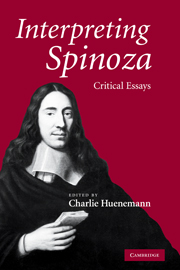Book contents
- Frontmatter
- Contents
- Notes on contributors
- Method of citation
- Introduction
- Chapter 1 Representation and consciousness in Spinoza's naturalistic theory of the imagination
- Chapter 2 Rationalism run amok: representation and the reality of emotions in Spinoza
- Chapter 3 “Whatever is, is in God”: substance and things in Spinoza's metaphysics
- Chapter 4 Necessitarianism in Spinoza and Leibniz
- Chapter 5 Epistemic autonomy in Spinoza
- Chapter 6 Spinoza and the philosophy of history
- Chapter 7 Democracy and the good life in Spinoza's philosophy
- Chapter 8 Spinoza's unstable politics of freedom
- Chapter 9 Should Spinoza have published his philosophy?
- Bibliography
- Index
Chapter 4 - Necessitarianism in Spinoza and Leibniz
Published online by Cambridge University Press: 22 September 2009
- Frontmatter
- Contents
- Notes on contributors
- Method of citation
- Introduction
- Chapter 1 Representation and consciousness in Spinoza's naturalistic theory of the imagination
- Chapter 2 Rationalism run amok: representation and the reality of emotions in Spinoza
- Chapter 3 “Whatever is, is in God”: substance and things in Spinoza's metaphysics
- Chapter 4 Necessitarianism in Spinoza and Leibniz
- Chapter 5 Epistemic autonomy in Spinoza
- Chapter 6 Spinoza and the philosophy of history
- Chapter 7 Democracy and the good life in Spinoza's philosophy
- Chapter 8 Spinoza's unstable politics of freedom
- Chapter 9 Should Spinoza have published his philosophy?
- Bibliography
- Index
Summary
Necessitarianism is the position that everything actual is necessary, or, that the actual world is the only possible world. Necessity and possibility are understood here as absolute or metaphysical. Bennett calls this a “tremendously implausible” view. And Curley and Walski say, “views that are tremendously implausible should not be attributed to great, dead philosophers without pretty strong textual evidence” (Curley and Walski 1999: 242). However, the textual evidence for attributing necessitarianism to Spinoza appears pretty strong. Moreover, I don't believe Spinoza's necessitarianism is tremendously implausible. I will develop the position I attribute to Spinoza by first looking at Leibniz's arguments concerning necessitarianism. Leibniz spent much more time than Spinoza trying to make his thoughts on the issue clear. However, I believe that the position of these two philosophers, on the question of the necessity of all things, is substantially the same. In brief, both philosophers distinguish between a thing's being intrinsically necessary, or necessary by virtue of its essence or concept alone, and its being extrinsically necessary, or necessary only by virtue of being entailed by something necessary. Both philosophers maintain that God's existence, and only God's existence, is intrinsically necessary. And, I believe, both philosophers are committed to the claim that everything else is extrinsically necessary, because its existence is entailed by the existence of God.
- Type
- Chapter
- Information
- Interpreting SpinozaCritical Essays, pp. 71 - 93Publisher: Cambridge University PressPrint publication year: 2008
- 4
- Cited by



